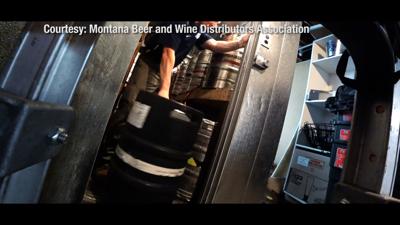MONTANA - The Montana Beer and Wine Distributors Association (MBWDA) is working to stop human trafficking in a new project called the Sentinel Project.
The Sentinel Project involves training beer and wine distributors to spot human trafficking. Part of that is having the Montana Human Trafficking Hotline on a sticker inside every truck. That number is 1-833-406-STOP.
The MBWDA said: "We are uniquely positioned to help fight this issue. We have access to locations that many of the public, and in some cases even law enforcement don’t – such as kitchens, storage and back rooms. We access these places monthly, weekly or even daily, which makes it easy to spot when something just isn’t right. We service over 3,200 accounts and are the eyes and ears of Montana’s highways and streets, convenience and grocery stores, restaurants, and bars, as well as Montana’s native reservations."
According to the Montana Department of Justice, there were 41 cases of human trafficking in 2020, a 485% increase from 2015 when the agency tracked seven cases. Twenty-nine adult victims and six juvenile victims were rescued in 2020, MDJ said.
Board President of MBWDA Mike Markovich said after they did training for the Sentinel Project, one distributor told him the following:
"'The other morning, two days ago, I was getting my morning coffee at 6:30 in the morning at a truck stop on the outskirts of town and I saw what I would classify as a young girl, 10-12 years old, getting out of the back of a sedan and she had a very short mini skirt on and high heels. Her hair was all made up and she had makeup. It was snowing sideways and it was 6:30 in the morning. And, I thought to myself, 'That just doesn't look right, but maybe sketchy behavior, they're not from here, they're traveling through.' And, I told him, 'That's what you saw. You likely saw someone trafficked right before your eyes, but you didn't have the resources to do anything about it.'"
MDJ said Native American women and girls are more susceptible to trafficking than other Montanans.
According to U.S. Justice Department, Native American women and girls account for 3.3% of the population, but account for 30% to 40% of human and sex trafficking victims in Montana.
MBWDA said signs of human trafficking to look for include the following:
- Young person that is very hesitant to engage in conversation
- Seems to have trouble responding to what their name is or what location (City or even State) they are in. (Victims’ names are often changed frequently, as are their whereabouts. They typically do not stay in one location for long – at times for 24 hours or less).
- Eyes are always downcast, avoiding eye contact, especially with men
- Poor physical state…tired, malnourished, or shows signs of physical abuse or torture
- Wearing clothes that do not fit the climate or the situation such as short shorts or skirts, tank tops, and has no jacket in the middle of winter
- Has a tattoo that looks like a brand (usually on the chest or neck); “daddy” written on a young girl, a crown, a barcode, QR code, or a name spelled backwards (to remind the victim who they belong to).
- Lack of control over, money, personal possessions like bags, ID’s, or documents. May also be carrying very few possessions in a plastic bag.
- Does not have their own mode of transportation
- Someone speaks on their behalf if they are asked a direct question
- May be accompanied by a dominating person, or someone they seem fearful of. That controlling person may also be someone who does not seem to “fit,” such as a much older individual, an individual of a different race, or with behavior seemingly inappropriate with the suspected victim
- Young girl (or boy) hanging around outside a convenience store, truck stop, casino, or other location. May be approaching different vehicles or men they do not seem to know.



































